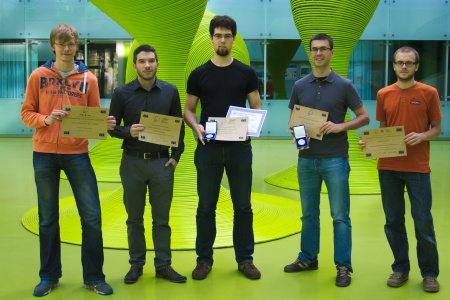Summer of Logic: Dresden Researchers Win Prizes at the Biggest Meeting of Logicians Ever
News of July 28, 2014
Summer of Logic: Dresden Researchers Win Prizes at the Biggest Meeting of Logicians Ever

Norbert Manthey, researcher at the Knowledge Representation group, won first prizes in multiple competitions when solving propositional logic satisfiability problems. He celebrates his success together with Peter Steinke (Knowledge Representation) and Enrique Matos Alfonso (4th semester Computational Logic), who contributed signficantly to the winning systems Optimax and Riss Blaxbox. The two medals that the team could take home are only part of the overall success: overall, the group achieved ten top-3 results in five different competitions.
Another Gödel Medals was won by Markus Krötzsch, Emmy Noether research group leader, together with colleagues from the universities of Ulm and Oxford. Their system ELK came first in classifying large description logic knowledge bases that are of practical importance in the life sciences.
Besides these applied works, however, excellent foundational research was also awarded in Vienna. Stefan Borgwardt, doctoral researcher in the Automata Theory group, received the Distinguished Student Paper Award of the annual Description Logic Workshop for his work on fuzzy description logics.